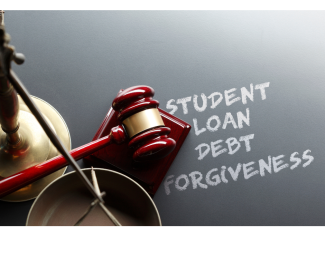
Student Loan Forgiveness on the Docket
You probably know that the Biden Administration’s student loan forgiveness plan has been tied up in the courts for months, due to a lawsuit by the state of Missouri and two private individuals. Legal scholars are somewhat perplexed, since none of these parties has claimed a direct injury (the individuals seem to believe that they wouldn’t get as much money as they’d like), but nonetheless the Supreme Court agreed to hear the case, and a ruling is likely to be against forgiving college-related loan obligations.
The forgiveness plan, if allowed to go forward, would cancel up to $10,000 in student debt for single borrowers earning less than $125,000; $250,000 for married households. Borrowers who received low-income Pell Grants would be eligible for an additional $10,000, for a combined $20,000 in loan forgiveness.
Meanwhile, there is a moratorium on government student loan payments that has continued since 2020, and this also means that interest is not accruing on the debt. The Department of Education says that payments will resume 60 days after the Supreme Court issues its ruling; if there is no ruling, then payments will resume in late August.
What to do? Since payments and interest are still suspended until the ruling, people who are eligible for debt relief, who owe less than $10,000 (or $20,000, if applicable) risk nothing by waiting to see what happens. If the Biden Administration wins the case, there is no reason to pay down debt that may ultimately be forgiven. People who owe more than the eligible amounts, or are not eligible for forgiveness, could pay down their debt while interest is not accruing.
The moratorium gave many recent graduates who were living under crushing amounts of debt to get themselves on a sound financial footing, and the result has been a surge in home buying, new births, retirement savings and new business formation. Economists have calculated that every 1% of student debt correlates with a 3.7% decrease in household spending; when the moratorium ends, and there is no debt relief, the impact will ripple through the economy, and could add to the possibilities of recession.
Source:

